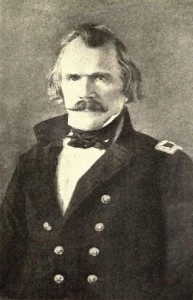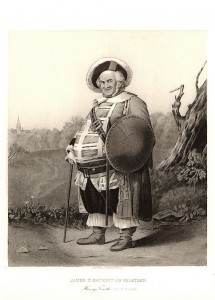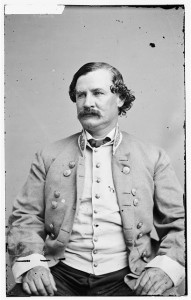Correspondent Disguised as Country Clerk Checks Out a Rebel Camp
From The New-York Times October 20, 1861:
INTERIOR OF THE REBEL CAMP AT COLUMBUS, KENTUCKY.
Approaching Columbus, it proved there the same as elsewhere, an easy matter to pass the pickets and get in, the only difficult to be feared that of getting cut, which, as my companion was a Kentuckian, and on business to Columbus, where he was known, a correspondent found himself turned into a country clerk crown [grown] on the same soil and travelling with his employer. If the food and drill agreed with him, as the latter observed to a Captain with a villainous eye and long hair, he might (?) become a good Confederate soldier. The country clerk preferred a wish to keep on ribbon measuring, and opened his eyes wide to see what there was to see, but failed in discovering anything at all remarkable at first. The novelty of the situation, surrounded by men whose arms were lifted, CAIN-like against their brothers, and ARNOLD-like to strike their country, was somewhat exciting, but that was all. Columbus is a monotenous, dull appearing little village, of usually five hundred inhabitants or thereabouts, but now populated by an army drawn from the glades of Florida, the cities of the South, the lines of the border, to meet that mighty host who have risen to seek among the cypress and cotton those stars stricken so rudely from their flag.
Correspondence of the Missouri Republican.
CAIRO, Sunday, Oct. 13, 1861.
The houses of the town are generally small, many painted white, and some few allowing good taste by their surroundings of shrubbery and cultivated grounds. On the river bank is the depot of the Mobile and Ohio Railroad, a commodious building, and the chief ornament of the place. No passenger, with carpet sack in hand, or porter with trunk on shoulder, were visible, but instead a regiment of gray uniformed fellows, from Louisiana, I understood, were occupying the depot. A locomotive attached to four platform and one passenger car, was standing idly on the track, but blew its whistle and started off shortly after. It seemed strange. An enemy’s camp, yet all Americans, in tone, speech and action similar to yourself and those in Union camps at other places. Instead of being a bloodthirsty, hoofed, horned and tailed multitude, there are good looking boys, effeminate men with downy beards, laughing, Falstaffian individuals also, as well as those with true military cut, among the secession multitude.
As there was danger of incurring suspicion, my explorations were limited, and I was unable to visit all the different points of interest. About half of those soldiers I saw were uniformed, while of the balance many had an army cap, a coat, pants with stripe or military mark of some kind, and the rest simply ordinary costume. Their arms were decidedly mixed, some of those in tents or hands of sentinels being revolving weapons, others breech-loading common muskets, hunting rifles, &c. I picked up one with the stamp “Harper’s Ferry” upon it. Tents were of the old style; some tattered and useless, others strong and new, but pitched in regular order. Discipline was evidently more lax than in Federal camps, and the men appeared to take things in a free and easy style. Shoes cave the most melancholy effect of the blockade. Those of leather showed numerous patches, and the long-haired Captain said a style made from thick cloth were being used instead. None of the uniforms of the soldiers were new, and a pinch will evidently come when they are worn out. Blankets were also scarce, and preparations for Winter scanty. A proclamation posted on the board proved to be from Gen. PILLOW, forbidding the inhabitants of Missouri or ports on the Mississippi sending any more bacon or provisions of any description South, as it was needed by the forces “in this department.”
The fortifications that defend Columbus are situated on the [???] just above the town and along Lucas bend. These I described in a former letter. They are so placed, and the natural advantages of the ground are such, that any attempt to take them without the cooperation of a powerful land force will prove unsuccessful and disastrous. I noticed but one cannon on the bank in front of the town, and that was a small one. Gen. JOHNSTON commands the forces there, and has with him PILLOW and CHEATHAM. The number of their troops was stated at 35,000, of whom 25,000 were then at Columbus, eight regiments having started the day before for some point inward. From all appearances the secession forces were themselves afraid of being attacked, and as long as they can keep the Federals, by feint and otherwise, from marching upon them, they will be well satisfied. There was quite a shade of anxiety on the face of him of the long hair when he asked, “Is it true they have taken New-Orleans?” and remarked, “if they have, we will welcome them with hospitable hands to bloody graves,” which, besides being an incorrect quotation, was not fresh enough to excite the admiration of his hearers. If he sees this, I hope he will appreciate the delicacy that prevented these remarks at that tune
My kingdom for a photo of Cain. At least I can let you know that James Henry Hackett was a famous American actor who did indeed play Falstaff.




